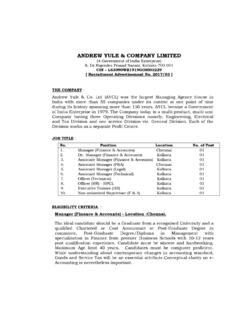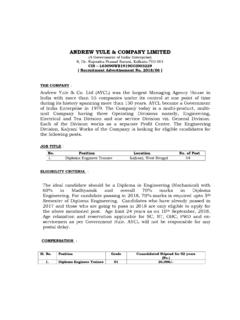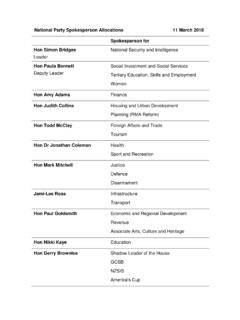Transcription of Internal Audit Manual - Andrew Yule and Company
1 PRIVATE & CONFIDENTIAL FOR Internal CIRCULATION ONLY Internal Audit Manual Andrew yule & CO. LIMITED INTETRNAL Audit Manual 1. INTRODUCTION The concept of Internal Audit has drastically changed from a system of mere checking the arithmetical accuracy of accounting data as in former days to a system of appraisal of the effectiveness of accounting, financial and other operations and controls as an aid to Management to achieve its goals of maximising production and profits. By constant review and appraisal of the workings of the systems and procedures introduced, Internal Audit enables Management to control and utilise widespread resources properly.
2 It acts as eyes and ears of Management in implementing its plans and decisions since most Management decisions have financial implications on the Company 's affairs. It is meant to be an effective means for the rapid and simultaneous observation of multiple events and transient situations which, properly assembled, can give a reliable guide to the well-being of an organization, an advance warning of undesirable trends and an indication of corrective action. The main purpose of having an Internal Audit System in an organisation is to verify and review the activities of all cost centres so as to assist them in seeing that the assets of the business are properly protected and accounted for, that current transactions are promptly and completely recorded, that faulty, inefficient or fradulent operations are revealed and that the business is adequately protected against waste, fraud and loss.
3 The purpose of this form of control is to assure early detection and rectification of errors to minimise their recurrence in future, to achieve economy in expenditure and all-round efficiency. It ensures that various rules and procedures laid down by the Management are actually followed and acted upon by all the cost centres. In view of the amendment of the Companies Act with a social Audit concept in India, it has become a statutory obligation on the part of a Company having a paid-up capital of Rs. 25 lakhs and above to have an Internal Audit System as the Statutory Auditors are required to comment upon the size end soundness of the Internal Audit System of the Company .
4 Statutory Auditors and Govt. Auditors rely much upon an efficient and effective system of Internal Audit during the course of Audit of the Company . With growing complexities and inter-relation of activities between various agencies, modern industries allover the world have realised the pressing need to have Internal Audit to help the Management at all levels in controlling the activities in the right direction. It is distinct from Statutory Audit as well as Govt. Audit . Statutory Audit is conducted by Auditors appointed under the Companies Act on behalf of shareholders of a Company and Govt. Audit is conducted by the Comptroller & Auditor General of India on behalf of the President of India where as Internal Audit is a part of the organisation and functions under the overall direction and control of its Management / Board and primarily responsible to it.
5 The function of Internal Audit in reviewing, appraising and reporting on established administrative policies, plans and procedures of the Company as an aid / assistance does not, however, in any way relieve the department / unit / tea estate / person concerned of responsibilities assigned to it / him. 2. ORGANISATIONAL STRUCTURE The Internal Audit Department is under the overall charge of the General Manager ( Internal Audit ) / Chief Internal Auditor who is responsible directly to the Chairman of the Company . He functions under the Director (Finance) through the Financial Controller.
6 Internal Audit Department - Organisational Structure of the Centralised Department of Andrew yule & Co. Ltd. General Manager ( Internal Audit ) / Chief Internal Auditor Sr. Manager ( Internal Audit ) (vacant at present) 4 Asst. Managers (1 vacancy at present) IAE IAE IAE IAE IAE IAE IAE IAE IAE means Internal Audit Executive. The Internal Audit Department shall conduct audits of departments / units / tea estates of the Company and its subsidiaries as well as its Branches / Offices and / or Associate Companies as per direction of Chairman through Director (Finance) and / or Financial Controller. 3. SCOPE & FUNCTIONS The scope of Internal Audit is very wide and cannot be laid down precisely.
7 However, broadly Internal Audit is concerned with any phase of business activity which can be the basis of service to Management. Internal Audit can focus the factors responsible for loss, failure or inefficiency so that they are rectified immediately, if possible, or measures can be taken to avoid their recurrence in future. The main duties and functions of Internal Audit , inter alia, are broadly classified as under : i) Systems Audit ii) Operational Audit including Efficiency Audit iii) Management Audit Since Internal Audit is a Management tool, its object is to assist the Management at various levels by providing it in time with objective analysis, appraisals, pertinent comments and recommendations in respect of the Company 's affairs to enable the Management to take timely remedial action.
8 Simplification of procedures, setting up of effective and efficient co-ordination between departments, gearing up of Internal controls, cost reduction by minimisation of wastages in various operations, revenue augmentation by proper inventory controls and maximum utilisation of machines, materials and manpower are same of the areas where Internal Audit can assist Management. Systems Audit : Ensuring that the rules and procedures as laid down by the Company from time to time are properly understood, correctly interpreted and complied with by the concerned personnel of the departments/units/tea estates of the Company is Systems Audit .
9 The Audit involves verification as to whether each deportment/unit/tea estate is maintaining proper records and having a reasonable system of recording receipts, issues end consumption of materials and stores and the system provides for proper allocation of the materials consumed, man hours spent and overheads incurred to the relative jobs. Improvements over the existing procedures need also be suggested, whenever necessary. When a change in the system is felt, only general recommendations should be indicated leaving the detailed system to the concerned department s / unit's / tea estate's personnel.
10 Operational Audit including Efficiency Audit : The functions of operational Audit is to ensure that Management controls are functioning effectively and efficiently in all the business activities of the Company and all the operations are in tune with its objectives. This Audit includes review of organisational structure, manufacturing processes, production planning and scheduling, adherence to prescribed technicalities in purchasing and other functions as apply to Govt. Companies to bring about overall efficiency. Audit examines that the broad and accepted principles of commercial accounting and practice have been consistently followed and any deviation from them is properly authorised and disclosed in the relevant statements.






